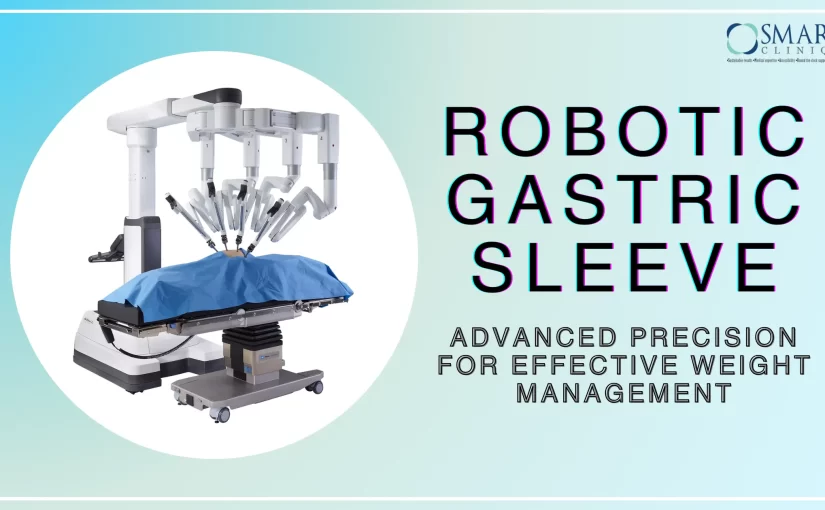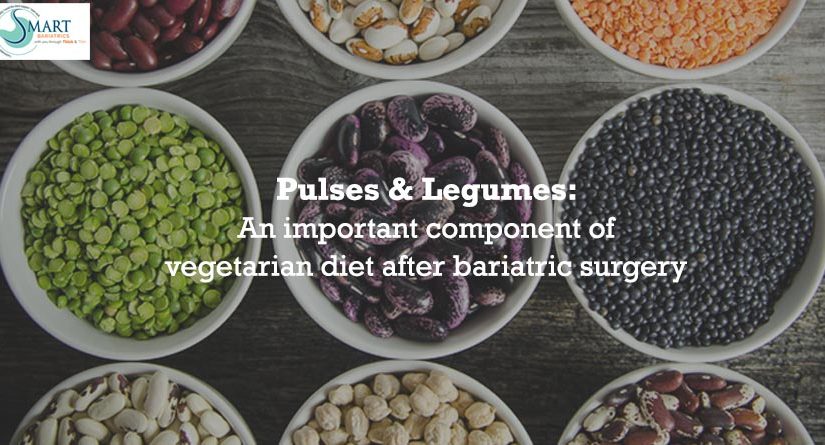Robotic Gastric Sleeve: A Minimally Invasive Approach to Weight Management
Weight Management is quickly growing into a significant global concern, transcending borders and cultures. Whether due to a sedentary lifestyle, poor dietary habits, or genetic or environmental factors, maintaining a healthy lifestyle is more important than ever.
Among the options for effective weight loss solutions, bariatric surgery has become the most effective option, and among the various surgery procedures, Robotic Gastric Sleeve also known as ‘Robotic Sleeve Gastrectomy‘ has emerged as the most common and advanced technique for those seeking long-term weight loss, improved health outcomes, and a better quality of life.
What is a Robotic Gastric Sleeve?
Robotic gastric sleeve is a type of bariatric surgery that helps in significant weight loss by reducing the size of the stomach.
During the procedure, around 75-80% of the stomach is removed, leaving behind a sleeve-shaped stomach, roughly the size of a banana, incapable of holding a lot of food. This, of course, brings about hormonal changes favourable for weight loss.
This highly effective option for surgery is performed using robotic technology that enhances the surgeon’s ability to make precise movements through small incisions better than traditional laparoscopic or open surgery methods.
Why is the Robotic Gastric Sleeve gaining popularity?
Those who receive the traditional approach might experience greater postoperative pain, longer hospital stays, and a delayed return to daily activities. But with this advanced robotic approach, they typically experience:
- Minimally Invasive: Smaller incisions and reduced trauma to surrounding tissues leading to lesser pain and faster recovery, unlike traditional methods.
- Improved Precision: Robotic surgery systems offer surgeons an HD 3D view of the operating area.
- Faster Recovery: Many patients are seen resuming their normal daily activities within a week.
- Reduced Risk of Complications: It reduces the risk of infection and other complications since the surgery is minimally invasive.
- Shorter Hospital Stay: With faster recovery times, many patients are able to go home within 24 hours after surgery.
Benefits of Robotic Gastric Sleeve Beyond Weight Loss
- Improved Metabolic Health: This leads to improvement of conditions like type 2 diabetes, high blood pressure, and high cholesterol.
- Enhanced Mobility: Losing excess weight often reduces joint pain and improves physical mobility, leading to a more active lifestyle.
- Better Quality of Life: As patients lose weight, many experience a boost in self-esteem, confidence, and mental health. The ability to participate in activities they may have previously avoided due to weight-related limitations can lead to a more fulfilling life.
- Reduced Risk of Obesity-Related Diseases: As patients achieve and maintain a healthier weight, their risk for heart disease, stroke, certain cancers, and other obesity-related conditions reduces.
Life-Changing Impact
A remarkable 95% of patients reported a significant enhancement in quality of life following bariatric surgery, while mortality rates decreased by a substantial 89% within five years.
- Migraines – 57% resolved?
- Depression – 55% resolved?
- Pseudotumor cerebri – 96% resolved?
- Obstructive sleep apnea – 74-98% resolved?
- Dyslipidemia hypercholesterolemia – 63% resolved?
- Asthma – 82% improved or resolved?
- Cardiovascular disease – 82% risk reduction?
- Hypertension – 52-92% resolved?
- Non-alcoholic fatty liver disease – 90% improved steatosis; 37% resolution of inflammation; 20% resolution of fibrosis?
- GERD (Gastroesophageal Reflux Disease) – 72-98% resolved?
- Metabolic syndrome – 80% resolved?
- Type II diabetes mellitus – 83% resolved?
- Stress urinary incontinence – 44-88% resolved?
- Polycystic ovarian syndrome – 79% resolution of hirsuitism; 100% resolution of menstrual dysfunction?
- Degenerative joint disease – 41-76% resolved?
- Venous stasis disease – 95% resolved?
Who is a Candidate for Robotic Gastric Sleeve?
Robotic gastric sleeve is typically recommended for people who have been unable to achieve sustained weight loss through traditional methods such as diet, exercise, or medication. This surgical approach is often considered for people with:
- BMI above 32.5 kg/m2 with obesity-related co-morbidities
- BMI above 37.5 kg/m2 even without co-morbidities.
- BMI > 30 kg/m2 with life-threatening obesity-related disorders like uncontrolled diabetes, cardiovascular disease/cardiomyopathy, and severe obstructive sleep apnea.
Bariatric surgery offers potential benefits, but it’s essential to weigh these against individual risks. Your weight, age, and medical history play a crucial role in determining your suitability for surgery. To make an informed decision, careful consideration of specific guidelines and patient factors is necessary.
- Patients motivated to lose weight and committed to long-term follow-up
- Patient should have attempted conservative methods of weight loss and failed in the past
- Bariatric Surgery is to be considered only between the ages of 18 – 65 years
- Bariatric surgery may be considered in patients more than 65 years old in the presence of severe obesity-related co-morbidities / disability
Bariatric Surgery may be considered in patients < 18 years in special situations after pediatrician/endocrinology certification, or after attainment of puberty or completion of skeletal maturity
Understanding the stages of Post-Surgery Recovery Process
- Initial Recovery: Most of the patients stay at the hospital for one or two days. During this time, the pain is managed, and hydration is ensured, along with the gradual introduction of liquids.
- Dietary Changes: The patient starts with a liquid diet and then progresses to soft food, ending with solid food over a period of weeks. The prescribed diet must be followed for faster results.
- Follow-up Care: An important factor that enables your health professional to understand any improvement in you and change your diet or medicine accordingly.
The Essential Lifestyle Factors for Long-Term Success
- Balanced Diet: Emphasize high-protein, low-carb foods, plenty of vegetables, and plenty of fluids.
- Regular Exercise: Incorporate cardio, strength training, or both in your workout session.
- Support Systems: participating in support groups or professional counseling can help maintain motivation and accountability in your actions.
Follow-up Care by Top Bariatric Surgeon in Delhi
Bariatric surgery is a transformative journey for many people struggling with obesity. While the surgery itself is a critical step towards weight loss and improved health, follow-up care is equally essential to ensure lasting outcomes.
Your choice of clinic and surgical team plays a crucial role in the success of your sleeve gastrectomy. Here’s why top bariatric surgery centres can make all the difference:
- Expertise at Every Step: A renowned bariatric surgeon runs a comprehensive bariatric program. They’ll guide you through pre-operative evaluation, ensure you have access to state-of-the-art surgical facilities, and offer extensive support post-surgery.?
- A Team You Can Trust: To run a comprehensive bariatric program, it is essential that the team comprises a Bariatric Surgeon, Bariatric Nurse, Bariatric Dietician, Program Managers, and Coordinators.
Before deciding, take some time to research renowned bariatric surgeons. Here are some key factors to consider:?
- Accreditation: Look out for clinics and surgeons accredited by recognized healthcare organizations, ensuring they meet the highest safety standards.?
- Surgeon Qualifications: Research the surgeon’s experience and qualifications in performing sleeve gastrectomy. ?
- Success Rates: Inquire about the surgeon’s success rates for the procedure.?
- Patient Testimonials: Reading real patient experiences can offer valuable insights into the surgeon’s approach and patient care.?
Consult with the best bariatric surgeon in Delhi for the finest possible care. And before you go somewhere else, why not read about us and rest assured that you are in safe hands?
Conclusion
Robotic gastric sleeve is a new revolutionary trend towards obesity management. The approach is recommendable for its minimally invasive nature, coupled with increased precision, and effective solution to fight obesity with less recovery time.
After you have opted for weight loss surgery, please consult a competent healthcare professional so that the Robotic gastric sleeve may become your first step toward transforming your life.








